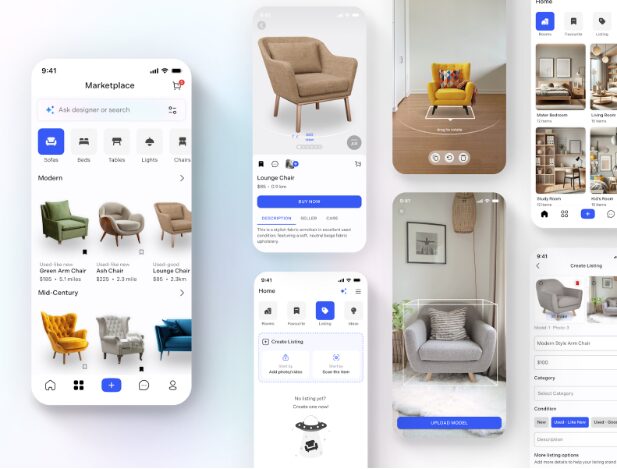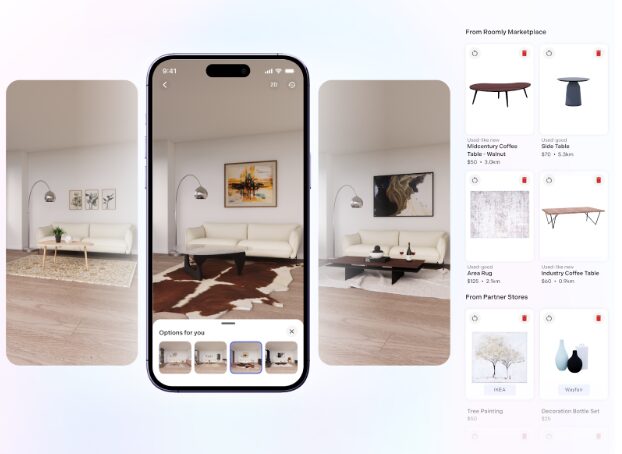In a remarkable sweep of this season’s most prestigious design competitions, Xiao Chen’s innovative interior design platform Roomly has captured three major industry honors, marking him as one of today’s most influential voices in digital product design. These achievements signal a transformative moment in both Chen’s career and the broader landscape of digital design tools.
The accolades began in October when Roomly earned a Silver award at the Muse Creative Awards, one of the most competitive international design competitions that typically sees over 6,000 entries from 18 countries. The platform’s groundbreaking approach to democratizing interior design particularly impressed the jury, comprised of leading designers from companies like Microsoft, Nike, and Airbnb. Their evaluation praised Roomly’s seamless integration of professional design principles with accessible user interfaces.
Hot on the heels of this recognition, Roomly secured another Silver at the November 2024 Titan Innovation Awards. Known for recognizing transformative innovations, the Titan Awards selected Roomly from thousands of entries, highlighting its unique integration of AI-driven design tools with sustainable practices. The jury particularly noted how the platform makes professional-grade design tools accessible to everyday users while maintaining high standards of functionality.
Most recently, Roomly’s gold prize at the prestigious International Design Awards has placed Chen’s work alongside projects from global technology leaders and renowned design studios. This gold prize is particularly significant, as the International Design Awards are widely regarded as the industry’s benchmark for excellence in user experience design, with past winners including groundbreaking projects from leading tech companies and design innovators.
“I never imagined a childhood fascination with spaces would lead to this,” Chen says with a smile, recalling his early days in Guancheng, a traditional water town in Zhejiang province. Growing up among ancient alleyways and wooden shopfronts, he developed an intimate understanding of how built environments shape daily life. “I remember exploring interconnected courtyards where multiple families lived together, watching shopkeepers remove their wooden panels each morning to open their stores. Those experiences taught me that design isn’t just about aesthetics—it’s about how people live and interact with their environment.”
This deep appreciation for the human element in design ultimately led Chen from architecture to digital product design. “I saw a gap between professional design expertise and everyday needs,” he explains. “While working as an architect, I noticed how many people struggled to visualize and plan their spaces effectively. Roomly was born from the desire to bridge that gap.”
The platform’s innovative features reflect this mission. Its AI-driven design tools help users explore possibilities they might never have considered, while the AR visualization system allows them to see exactly how different choices would look in their space. The pre-owned marketplace component promotes sustainability while making good design more accessible—a feature that particularly resonated with award jurors.
“We wanted to create something that wasn’t just another design app,” Chen explains, demonstrating Roomly’s 3D room scanner feature. “Every tool we developed had to serve a real need and make the design process more intuitive.” This attention to user needs shows in details like the guided design prompts that help users articulate their preferences and the AR-scanned products that let them “try before they buy.”
The platform’s success stems partly from Chen’s unique background in architecture. His understanding of spatial relationships and human movement through spaces informed Roomly’s development in subtle but crucial ways. “Architecture taught me that every design decision affects how people experience a space,” he notes. “We applied the same principle to Roomly’s interface—every feature had to enhance the user’s journey through the design process.”
Sustainability plays a central role in Roomly’s philosophy. The platform’s pre-owned marketplace makes design more affordable and promotes furniture reuse, reducing waste and environmental impact. The AR visualization features help users make confident decisions without unnecessary purchases or returns, reducing their carbon footprint.
“What’s remarkable about Roomly is how it makes sophisticated design tools feel approachable,” notes one industry observer. “Chen has managed to translate complex architectural principles into an interface that feels intuitive for everyday users while maintaining professional-grade capabilities.”
Looking ahead, Chen remains focused on evolving Roomly to meet user needs. “These awards are encouraging, but what really drives us is the feedback from users who’ve been able to transform their spaces in ways they never thought possible,” he says. “Every feature we add, every improvement we make, comes from listening to our users and understanding their challenges.”
The recent string of awards suggests that Chen’s vision for democratizing design while promoting sustainability is resonating strongly with both industry experts and users. “Design should make life better,” Chen reflects, sitting in his own thoughtfully arranged workspace. “Whether it’s through architecture or digital tools, the goal remains the same—to create solutions that help people live better while respecting our environment.” As Roomly continues to gather accolades and user praise, it’s clear that Chen’s innovative approach is helping shape the future of design technology.































